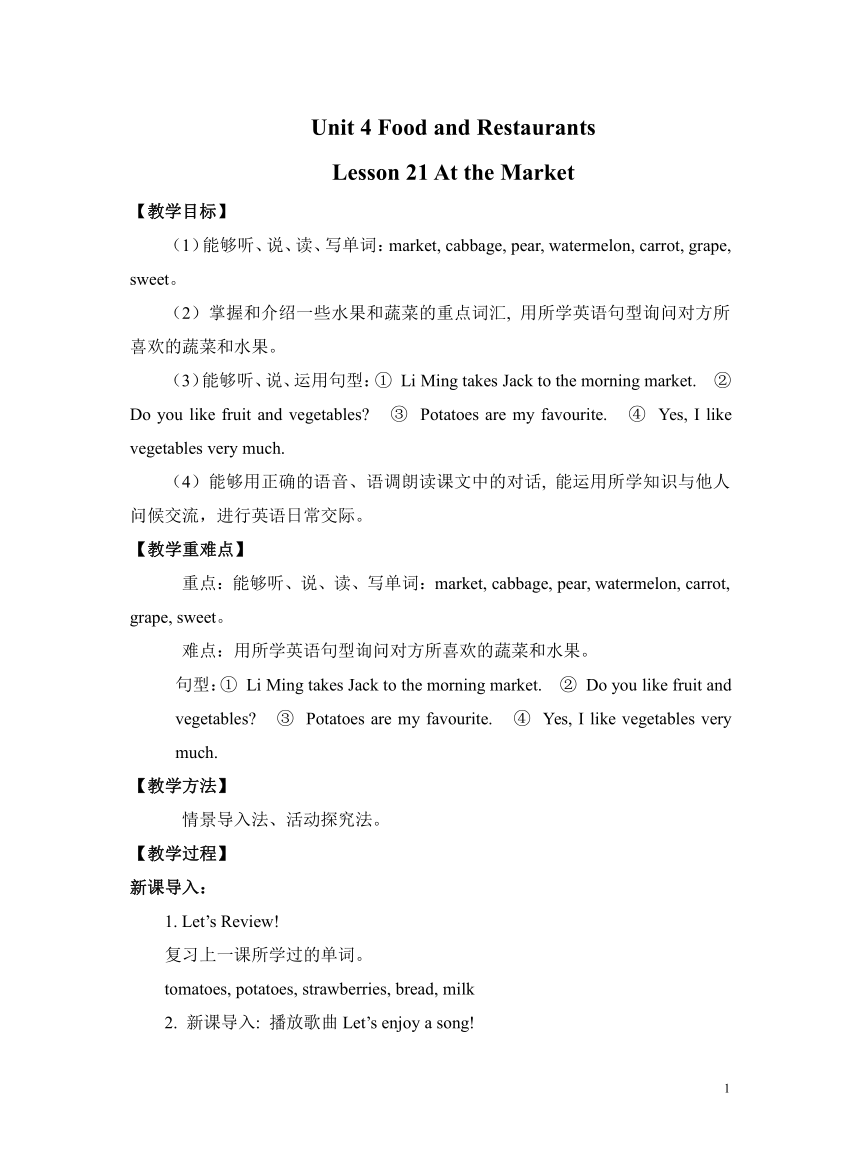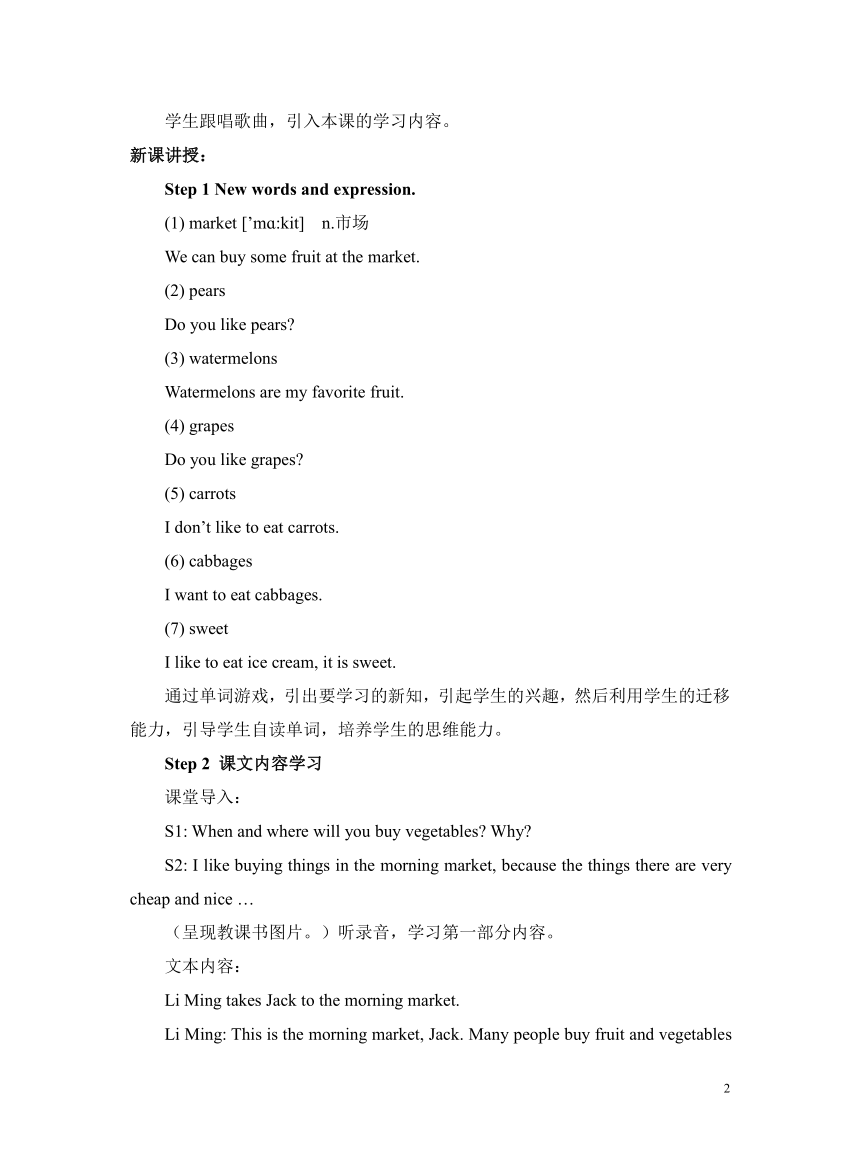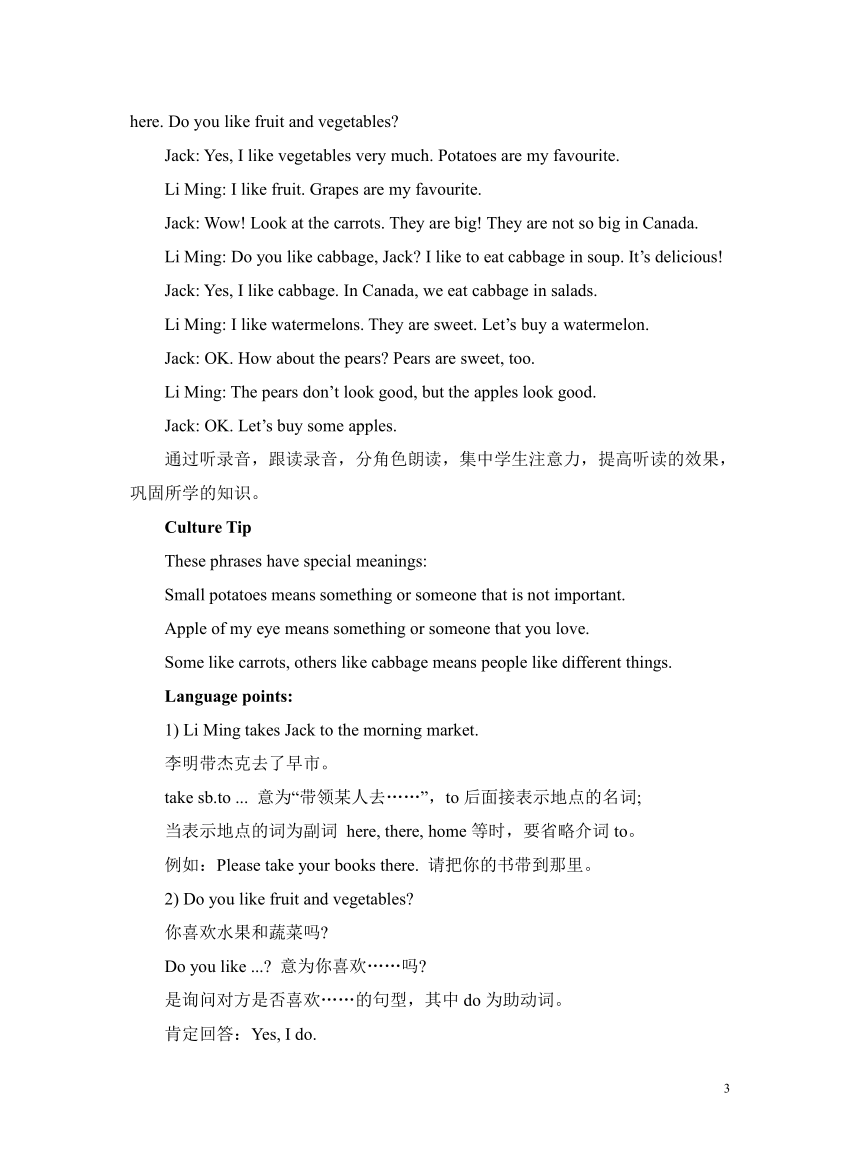冀教版英语七年级上册 Unit 4 Food and Restaurants Lesson 21 At the Market 教案
文档属性
| 名称 | 冀教版英语七年级上册 Unit 4 Food and Restaurants Lesson 21 At the Market 教案 |

|
|
| 格式 | docx | ||
| 文件大小 | 19.6KB | ||
| 资源类型 | 教案 | ||
| 版本资源 | 冀教版 | ||
| 科目 | 英语 | ||
| 更新时间 | 2023-09-06 23:07:19 | ||
图片预览



文档简介
Unit 4 Food and Restaurants
Lesson 21 At the Market
【教学目标】
(1)能够听、说、读、写单词:market, cabbage, pear, watermelon, carrot, grape, sweet。
(2)掌握和介绍一些水果和蔬菜的重点词汇, 用所学英语句型询问对方所喜欢的蔬菜和水果。
(3)能够听、说、运用句型:① Li Ming takes Jack to the morning market. ② Do you like fruit and vegetables ③ Potatoes are my favourite. ④ Yes, I like vegetables very much.
(4)能够用正确的语音、语调朗读课文中的对话, 能运用所学知识与他人问候交流,进行英语日常交际。
【教学重难点】
重点:能够听、说、读、写单词:market, cabbage, pear, watermelon, carrot, grape, sweet。
难点:用所学英语句型询问对方所喜欢的蔬菜和水果。
句型:① Li Ming takes Jack to the morning market. ② Do you like fruit and vegetables ③ Potatoes are my favourite. ④ Yes, I like vegetables very much.
【教学方法】
情景导入法、活动探究法。
【教学过程】
新课导入:
1. Let’s Review!
复习上一课所学过的单词。
tomatoes, potatoes, strawberries, bread, milk
2. 新课导入: 播放歌曲Let’s enjoy a song!
学生跟唱歌曲,引入本课的学习内容。
新课讲授:
Step 1 New words and expression.
(1) market [’mɑ:kit] n.市场
We can buy some fruit at the market.
(2) pears
Do you like pears
(3) watermelons
Watermelons are my favorite fruit.
(4) grapes
Do you like grapes
(5) carrots
I don’t like to eat carrots.
(6) cabbages
I want to eat cabbages.
(7) sweet
I like to eat ice cream, it is sweet.
通过单词游戏,引出要学习的新知,引起学生的兴趣,然后利用学生的迁移能力,引导学生自读单词,培养学生的思维能力。
Step 2 课文内容学习
课堂导入:
S1: When and where will you buy vegetables Why
S2: I like buying things in the morning market, because the things there are very cheap and nice …
(呈现教课书图片。)听录音,学习第一部分内容。
文本内容:
Li Ming takes Jack to the morning market.
Li Ming: This is the morning market, Jack. Many people buy fruit and vegetables here. Do you like fruit and vegetables
Jack: Yes, I like vegetables very much. Potatoes are my favourite.
Li Ming: I like fruit. Grapes are my favourite.
Jack: Wow! Look at the carrots. They are big! They are not so big in Canada.
Li Ming: Do you like cabbage, Jack I like to eat cabbage in soup. It’s delicious!
Jack: Yes, I like cabbage. In Canada, we eat cabbage in salads.
Li Ming: I like watermelons. They are sweet. Let’s buy a watermelon.
Jack: OK. How about the pears Pears are sweet, too.
Li Ming: The pears don’t look good, but the apples look good.
Jack: OK. Let’s buy some apples.
通过听录音,跟读录音,分角色朗读,集中学生注意力,提高听读的效果,巩固所学的知识。
Culture Tip
These phrases have special meanings:
Small potatoes means something or someone that is not important.
Apple of my eye means something or someone that you love.
Some like carrots, others like cabbage means people like different things.
Language points:
1) Li Ming takes Jack to the morning market.
李明带杰克去了早市。
take sb.to ... 意为“带领某人去……”,to后面接表示地点的名词;
当表示地点的词为副词 here, there, home等时,要省略介词to。
例如:Please take your books there. 请把你的书带到那里。
2) Do you like fruit and vegetables
你喜欢水果和蔬菜吗
Do you like ... 意为你喜欢……吗
是询问对方是否喜欢……的句型,其中do为助动词。
肯定回答:Yes, I do.
否定回答:No, I don’t.
e.g.—Do you like apples
—Yes, I do. / No, I don’t.
3) Potatoes are my favourite.
土豆是我最喜欢的(蔬菜)。
potato是可数名词,复数形式为potatoes。
常见以“o”结尾加“es”变复数的单词有:英雄hero, 西红柿tomato, 土豆potato。
favourite在句中作名词,意为“最喜欢的人或事物”。
e.g. Jay Chou is her favourite.
周杰伦是她最喜欢的(歌手)。
4) Yes, I like vegetables very much.
是的,我非常喜欢蔬菜。
like … very much 意为“非常喜欢……”;
常用于表达个人喜好;还可表达为like … a lot。
e.g.
She likes peaches very much.
=She likes peaches a lot.
Step 3 Let’s Do It!
1. Listen and fill in the blanks.
2. Read the lesson and write true (T) or false (F).
3. Look at the pictures and fill in the blanks.
4. Work in groups. Do you like fruit and vegetables
Interview your classmates and fill in the table.
5. Make a survey.
Role play
1. Role play the conversation in groups;
2. Role play the conversation in front of the class.
课堂练习:
一、根据汉语提示完成句子,每空一词。
1. Many people buy ________(蔬菜) in the morning market.
2. ________ ________ ________(你喜欢) apples
3. I like to eat ________ ________ ________(汤里的卷心菜).
4. Wang Mei ________ ________(不喜欢) taking photos.
5. ________ ________ (让我们买) some bananas.
二、单项选择。
1. My mother buys ________ watermelon. It tastes sweet.
A. a B. an C. the D. /
2. The pears look ________. I like them.
A. good B. well C. bad D. badly
3. —Do you like fruit —Yes. I ________.
A. like it very much B. like them a lot C. like a lot it D. very like them
4. —What are your favourite vegetables —________.
A. Pears B. Grapes C. Carrots D. Watermelons
三、连词成句。
1. are, how much, apples, the ( )
___________________________________________________
2. cabbage, to, you, like, eat, do ( )
___________________________________________________
3. the, one, blue, how about ( )
___________________________________________________
4. strawberries, favourite, are, my (.)
___________________________________________________
课堂小结:
T: What did you learn about this lesson
学生自由说,教师总结。
语言知识:
1) 识记以下单词: market, cabbage, pear, watermelon, carrot, grape, sweet。
2) 掌握短语及句型: ① Li Ming takes Jack to the morning market.
② Do you like fruit and vegetables
③ Potatoes are my favourite.
④ Yes, I like vegetables very much.
语言技能:
1)能运用所学知识与他人问候交流。
2)听懂并能进行英语日常交际。。
将本节课所学的知识进行归纳,帮助学生理解和记忆,巩固提升本课时所学的知识。
作业布置:
完成配套课后练习。
【板书设计】
Unit 4 Food and Restaurants
Lesson 21 At the Market
market, cabbage, pear, watermelon, carrot, grape, sweet
① Li Ming takes Jack to the morning market.
② Do you like fruit and vegetables
③ Potatoes are my favourite.
④ Yes, I like vegetables very much.
【课后反思】
本课时的教学内容是冀教版七年级上册英语第四单元的第三课时, 重点在于引导学生谈论自己关于蔬菜、水果的喜好, 从“在早市购物”开始, 自然地导入买蔬菜和水果的话题。以在早市买蔬菜和水果作为任务引起学生的兴趣, 训练学生的听力和口语表达能力。利用动作、手势和图片学习英语单词, 同时在对话中反复运用新学的单词和短语。因此, 教师可以将知识目标定为掌握本课时新出现的词和短语, 询问对方喜好的句型。
1
Lesson 21 At the Market
【教学目标】
(1)能够听、说、读、写单词:market, cabbage, pear, watermelon, carrot, grape, sweet。
(2)掌握和介绍一些水果和蔬菜的重点词汇, 用所学英语句型询问对方所喜欢的蔬菜和水果。
(3)能够听、说、运用句型:① Li Ming takes Jack to the morning market. ② Do you like fruit and vegetables ③ Potatoes are my favourite. ④ Yes, I like vegetables very much.
(4)能够用正确的语音、语调朗读课文中的对话, 能运用所学知识与他人问候交流,进行英语日常交际。
【教学重难点】
重点:能够听、说、读、写单词:market, cabbage, pear, watermelon, carrot, grape, sweet。
难点:用所学英语句型询问对方所喜欢的蔬菜和水果。
句型:① Li Ming takes Jack to the morning market. ② Do you like fruit and vegetables ③ Potatoes are my favourite. ④ Yes, I like vegetables very much.
【教学方法】
情景导入法、活动探究法。
【教学过程】
新课导入:
1. Let’s Review!
复习上一课所学过的单词。
tomatoes, potatoes, strawberries, bread, milk
2. 新课导入: 播放歌曲Let’s enjoy a song!
学生跟唱歌曲,引入本课的学习内容。
新课讲授:
Step 1 New words and expression.
(1) market [’mɑ:kit] n.市场
We can buy some fruit at the market.
(2) pears
Do you like pears
(3) watermelons
Watermelons are my favorite fruit.
(4) grapes
Do you like grapes
(5) carrots
I don’t like to eat carrots.
(6) cabbages
I want to eat cabbages.
(7) sweet
I like to eat ice cream, it is sweet.
通过单词游戏,引出要学习的新知,引起学生的兴趣,然后利用学生的迁移能力,引导学生自读单词,培养学生的思维能力。
Step 2 课文内容学习
课堂导入:
S1: When and where will you buy vegetables Why
S2: I like buying things in the morning market, because the things there are very cheap and nice …
(呈现教课书图片。)听录音,学习第一部分内容。
文本内容:
Li Ming takes Jack to the morning market.
Li Ming: This is the morning market, Jack. Many people buy fruit and vegetables here. Do you like fruit and vegetables
Jack: Yes, I like vegetables very much. Potatoes are my favourite.
Li Ming: I like fruit. Grapes are my favourite.
Jack: Wow! Look at the carrots. They are big! They are not so big in Canada.
Li Ming: Do you like cabbage, Jack I like to eat cabbage in soup. It’s delicious!
Jack: Yes, I like cabbage. In Canada, we eat cabbage in salads.
Li Ming: I like watermelons. They are sweet. Let’s buy a watermelon.
Jack: OK. How about the pears Pears are sweet, too.
Li Ming: The pears don’t look good, but the apples look good.
Jack: OK. Let’s buy some apples.
通过听录音,跟读录音,分角色朗读,集中学生注意力,提高听读的效果,巩固所学的知识。
Culture Tip
These phrases have special meanings:
Small potatoes means something or someone that is not important.
Apple of my eye means something or someone that you love.
Some like carrots, others like cabbage means people like different things.
Language points:
1) Li Ming takes Jack to the morning market.
李明带杰克去了早市。
take sb.to ... 意为“带领某人去……”,to后面接表示地点的名词;
当表示地点的词为副词 here, there, home等时,要省略介词to。
例如:Please take your books there. 请把你的书带到那里。
2) Do you like fruit and vegetables
你喜欢水果和蔬菜吗
Do you like ... 意为你喜欢……吗
是询问对方是否喜欢……的句型,其中do为助动词。
肯定回答:Yes, I do.
否定回答:No, I don’t.
e.g.—Do you like apples
—Yes, I do. / No, I don’t.
3) Potatoes are my favourite.
土豆是我最喜欢的(蔬菜)。
potato是可数名词,复数形式为potatoes。
常见以“o”结尾加“es”变复数的单词有:英雄hero, 西红柿tomato, 土豆potato。
favourite在句中作名词,意为“最喜欢的人或事物”。
e.g. Jay Chou is her favourite.
周杰伦是她最喜欢的(歌手)。
4) Yes, I like vegetables very much.
是的,我非常喜欢蔬菜。
like … very much 意为“非常喜欢……”;
常用于表达个人喜好;还可表达为like … a lot。
e.g.
She likes peaches very much.
=She likes peaches a lot.
Step 3 Let’s Do It!
1. Listen and fill in the blanks.
2. Read the lesson and write true (T) or false (F).
3. Look at the pictures and fill in the blanks.
4. Work in groups. Do you like fruit and vegetables
Interview your classmates and fill in the table.
5. Make a survey.
Role play
1. Role play the conversation in groups;
2. Role play the conversation in front of the class.
课堂练习:
一、根据汉语提示完成句子,每空一词。
1. Many people buy ________(蔬菜) in the morning market.
2. ________ ________ ________(你喜欢) apples
3. I like to eat ________ ________ ________(汤里的卷心菜).
4. Wang Mei ________ ________(不喜欢) taking photos.
5. ________ ________ (让我们买) some bananas.
二、单项选择。
1. My mother buys ________ watermelon. It tastes sweet.
A. a B. an C. the D. /
2. The pears look ________. I like them.
A. good B. well C. bad D. badly
3. —Do you like fruit —Yes. I ________.
A. like it very much B. like them a lot C. like a lot it D. very like them
4. —What are your favourite vegetables —________.
A. Pears B. Grapes C. Carrots D. Watermelons
三、连词成句。
1. are, how much, apples, the ( )
___________________________________________________
2. cabbage, to, you, like, eat, do ( )
___________________________________________________
3. the, one, blue, how about ( )
___________________________________________________
4. strawberries, favourite, are, my (.)
___________________________________________________
课堂小结:
T: What did you learn about this lesson
学生自由说,教师总结。
语言知识:
1) 识记以下单词: market, cabbage, pear, watermelon, carrot, grape, sweet。
2) 掌握短语及句型: ① Li Ming takes Jack to the morning market.
② Do you like fruit and vegetables
③ Potatoes are my favourite.
④ Yes, I like vegetables very much.
语言技能:
1)能运用所学知识与他人问候交流。
2)听懂并能进行英语日常交际。。
将本节课所学的知识进行归纳,帮助学生理解和记忆,巩固提升本课时所学的知识。
作业布置:
完成配套课后练习。
【板书设计】
Unit 4 Food and Restaurants
Lesson 21 At the Market
market, cabbage, pear, watermelon, carrot, grape, sweet
① Li Ming takes Jack to the morning market.
② Do you like fruit and vegetables
③ Potatoes are my favourite.
④ Yes, I like vegetables very much.
【课后反思】
本课时的教学内容是冀教版七年级上册英语第四单元的第三课时, 重点在于引导学生谈论自己关于蔬菜、水果的喜好, 从“在早市购物”开始, 自然地导入买蔬菜和水果的话题。以在早市买蔬菜和水果作为任务引起学生的兴趣, 训练学生的听力和口语表达能力。利用动作、手势和图片学习英语单词, 同时在对话中反复运用新学的单词和短语。因此, 教师可以将知识目标定为掌握本课时新出现的词和短语, 询问对方喜好的句型。
1
同课章节目录
- Unit 1 School and friends
- Lesson 1 Hello!
- Lesson 2 Teacher and Students
- Lesson 3 Welcome to Our School
- Lesson 4 What Is It?
- Lesson 5 May I Have a Book?
- Lesson 6 Things for School
- Unit 2 Colours and Clothes
- Lesson 7 Jenny's New Skirt
- Lesson 8 Danny's Favourit Colou
- Lesson 9 Whose Coat Is This?
- Lesson 10 Clothes for a Cold Day
- Lesson 11 Clothes around the World
- Lesson 12 Let's Go Shopping!
- Unit 3 Body Parts and Feelings
- Lesson 13 Body Parts
- Lesson 14 Colours and Feelings
- Lesson 15 Tall or Short
- Lesson 16 Happy or Sad
- Lesson 17 Seeing a Docto
- Lesson 18 We All Look Different!
- Unit 4 Food and Restaurants
- Lesson 19 Time for Breakfast!
- Lesson 20 I Like the Supermarket!
- Lesson 21 At the Market
- Lesson 22 In the Restaurant
- Lesson 23 The Corner Store
- Lesson 24 Eat Good Food!
- Unit 5 Family and Home
- Lesson 25 Jenny's Family
- Lesson 26 Li Ming's Family
- Lesson 27 Danny at Home
- Lesson 28 A Family Picnic
- Lesson 29 A Birthday Card
- Lesson 30 Grandma's Birthday Party
- Unit 6 Let's Go!
- Lesson 31 Let's Go to the Bookstore!
- Lesson 32 At the Supermarket
- Lesson 33 Let's Go to the Zoo!
- Lesson 34 On the Farm
- Lesson 35 Let's Go to the Museum!
- Lesson 36 Let's Go to the Movie Theatre!
- Unit 7 Days and Months
- Lesson 37 Seasons and Weathe
- Lesson 38 Nick's Busy Month
- Lesson 39 A Class Calenda
- Lesson 40 When Is Your Birthday?
- Lesson 41 Holidays
- Lesson 42 Happy Holidays!
- Unit 8 Countries around the world
- Lesson 43 Directions
- Lesson 44 Jack's Goodbye Party
- Lesson 45 China
- Lesson 46 Canada and the U.S.
- Lesson 47 The U.K. and Australia
- Lesson 48 English-Speaking Countries
